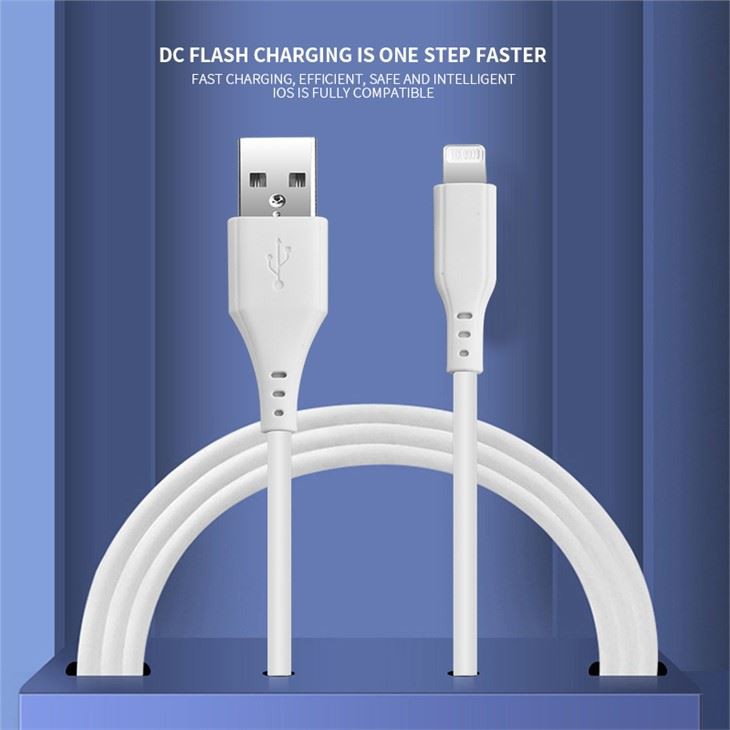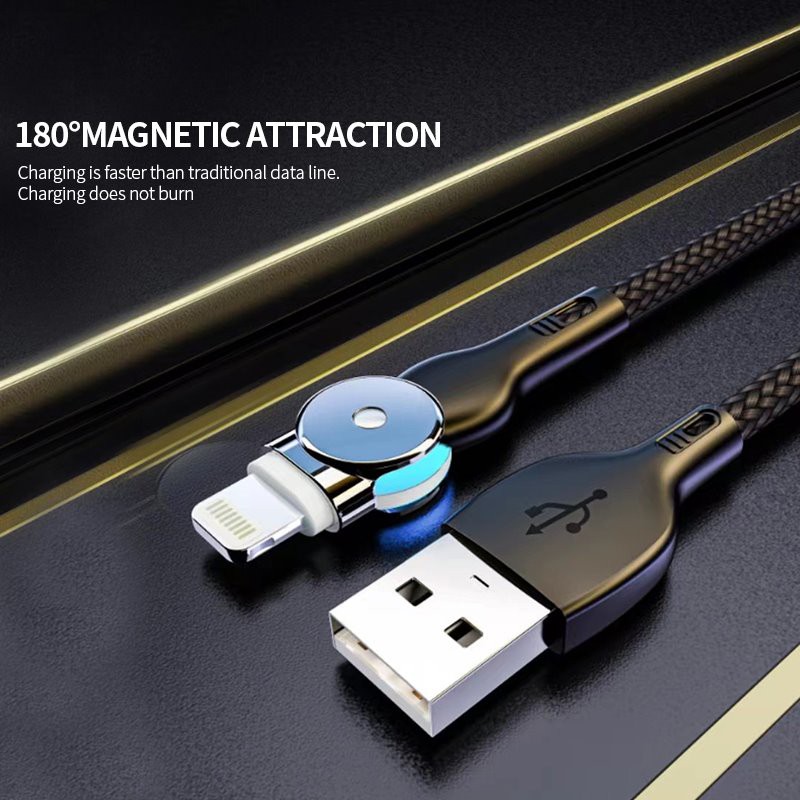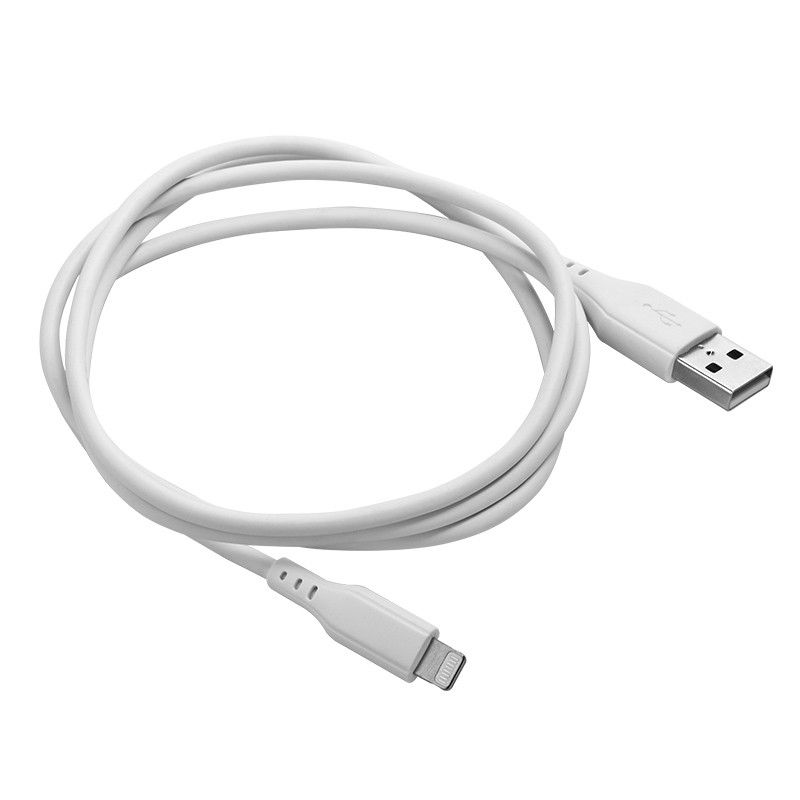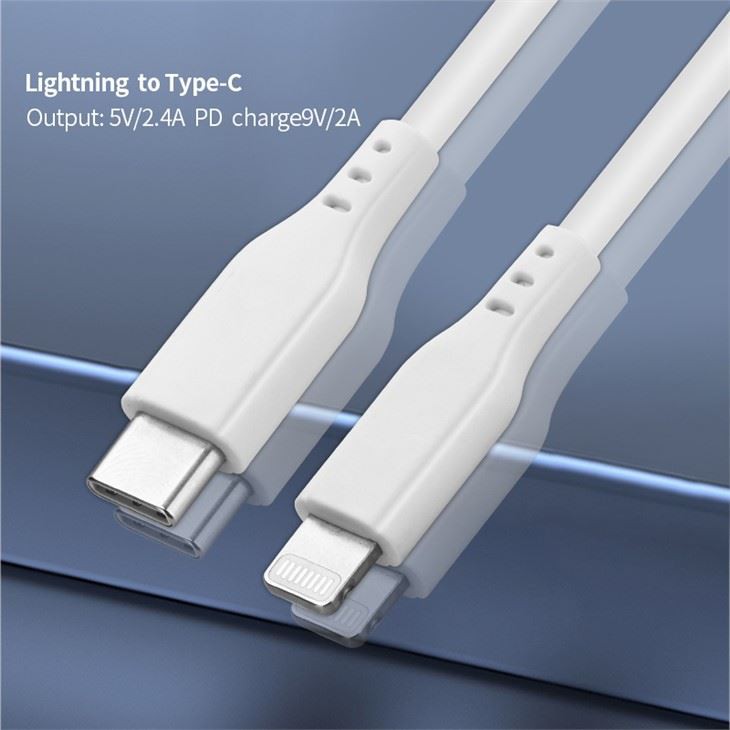Why Choose Us?
Competitive Price
We are committed to providing our customers with the best quality products and services at competitive prices.
Quality Control
We have a strict quality control system to ensure that our products meet the highest standards of quality.
After-Sale Service
Our personnel are generally within the spirit of continuous improvement and excellence, and using the excellent top quality goods, favorable rate and superior after-sales expert services, we try to win every customer's believe in for Usb C Cable Data Transfer.
24H Online Service
If you have difficulties when using the product, we will respond to your needs as soon as possible and give you the greatest support.
MFi cable refers to a Lightning to USB cable that has been certified by Apple and meets its relevant standards. It is the only cable that can be used with Apple devices for charging and data transmission. Apple's MFi certification program ensures that cables meet high standards of quality and safety, ensuring that users can use them safely and with peace of mind. In contrast, cables that are not MFi certified may not be compatible with Apple devices, and may even pose safety hazards. Therefore, it is recommended that users purchase cables that are MFi certified to ensure their safety and compatibility.
Advantages of MFi Cable
Compatibility:
MFi cables are specifically designed and tested to work with Apple devices, ensuring seamless compatibility and reliable performance. They are recognized by Apple devices and provide optimal charging and data transmission speeds.
Safety:
MFi cables meet Apple's strict safety standards and undergo rigorous testing to ensure they are safe to use. They comply with safety regulations and are less likely to cause damage to your Apple device or pose a risk of fire or electric shock.
Quality Assurance:
MFi cables are produced by reputable manufacturers who adhere to high-quality standards. This ensures that the cables are durable, reliable, and built to last. They often feature better materials, stronger connections, and improved insulation, reducing the likelihood of breakage or failure.
Access to Apple Support:
When using MFi cables, you can enjoy the support and warranty provided by Apple. If you encounter any issues or have any questions, you can contact Apple for assistance, which may not be available for non-MFi cables.
The material of an MFi cable is typically a high-quality combination of copper wires and insulation materials. The copper wires are responsible for carrying the electrical current and ensuring fast and efficient charging and data transmission. The insulation materials protect the wires and prevent any electrical shorts or damage. MFi cables often feature a braided or twisted design, which not only adds durability but also enhances the aesthetic appeal. The outer casing of the cable is usually made from a flexible and durable material like PVC (Polyvinyl Chloride) or rubber, which protects the internal wires and insulation from damage. The material of an MFi cable is chosen to ensure durability, safety, and optimal performance when used with Apple devices. These cables are typically made by reputable manufacturers who adhere to strict quality standards and use only high-quality materials in their production.
Application of MFi Cable
Charging:
MFi cables are commonly used to charge Apple devices. They connect your device to a power source, such as a wall charger or a computer's USB port, and transfer power efficiently and safely.
Data Transfer:
In addition to charging, MFi cables can also be used for data transfer between Apple devices. You can use them to sync content between your iPhone and Mac, transfer files between your iPad and another device, or even backup your iPhone to a computer.
Connecting to External Devices:
MFi cables can also be used to connect your Apple device to external devices, such as digital cameras, external hard drives, or other USB-enabled devices. This allows you to import photos, videos, or other files from these devices to your Apple device.
Car Chargers and Audio Systems:
MFi cables are often used in car chargers and audio systems to connect your iPhone or iPad to the vehicle's power source or audio system for charging and media playback.
Travel and Office Use:
MFi cables are essential for travel and office use, as they allow you to charge your Apple devices and transfer data wherever you go.

MFi cables are generally considered to be more durable than non-MFi cables, but this is not always the case. The durability of a cable depends on various factors, including the quality of materials used, the manufacturing process, and the overall design. MFi cables are typically made by Apple-approved manufacturers and are designed to meet strict quality standards. They use high-quality materials and are often tested for durability and safety. Additionally, they undergo certification by Apple to ensure compatibility and reliability with Apple devices. On the other hand, non-MFi cables may vary in quality and durability. While some may be made with good materials and a solid design, others may use cheaper materials or have a less robust construction. This can lead to issues such as fraying, breakage, or performance issues over time. It's important to note that even MFi cables can become damaged or worn out if not handled properly. Excessive bending, pulling, or exposure to extreme temperatures can affect the durability of any cable. Therefore, it's important to handle cables carefully and avoid excessive stress or abuse.
Can I Use an MFi Cable to Charge My iPhone and Ipad at the Same Time?
You can use an MFi cable to charge your iPhone and iPad at the same time, provided you have a power source that can provide enough power to charge both devices simultaneously. To do this, you would need a power adapter or charger that has multiple USB ports. You can then connect an MFi cable to each of the devices and plug the other end of the cables into the respective USB ports on the power adapter. It's important to note that the total power output of the power adapter should be sufficient to charge both devices simultaneously. If the power adapter can't provide enough power, it may take longer to charge the devices, or one of the devices may not charge at all. Additionally, it's always a good practice to use the original Apple charger or a reputable third-party charger that is designed to work with Apple devices. Using incompatible or low-quality chargers may damage your devices or affect their performance.
There are several specific features of an MFi cable that make it different from a regular cable. Here are some of the key differences:
Compatibility:
MFi cables are specifically designed to work with Apple devices and have been certified by Apple to ensure compatibility. They are made to meet strict quality standards and are often tested for performance and safety. Regular cables, on the other hand, may or may not be compatible with Apple devices and may not have undergone the same level of testing and certification.
Materials and Construction:
MFi cables typically use higher-quality materials and a more robust construction than regular cables. This can result in better durability and longer lifespan. Regular cables may use cheaper materials and may not be as well-built, which can lead to issues such as fraying, breakage, or performance issues over time.
Safety Features:
MFi cables often include additional safety features to protect your devices and ensure safe charging. These features may include over-current protection, over-voltage protection, and short-circuit protection. Regular cables may not include these safety features or may have less robust protection mechanisms.
MFi Logo:
Another key difference is the MFi logo. MFi cables are marked with the MFi logo, which is a trademark of Apple, indicating that they have been approved for use with Apple devices. Regular cables do not typically have this logo.

You can use an MFi cable to transfer data between your Apple devices. MFi cables are designed to be compatible with Apple devices and are often used for both charging and data transfer. When you connect two Apple devices using an MFi cable, you can transfer files, photos, videos, and other data between them. For example, you can connect your iPhone to your Mac using an MFi cable and then use iTunes or Finder to sync and transfer files between the two devices. If you have an iPad and an iPhone, you can use an MFi cable to set up a personal hotspot on your iPhone and connect your iPad to the internet using the iPhone's data plan. It's important to note that the data transfer speed may vary depending on the type of cable and the devices you are using. Additionally, some older devices may not support certain data transfer features or speeds.
You can use an MFi cable to transfer data between your Apple devices. MFi cables are designed to be compatible with Apple devices and are often used for both charging and data transfer. When you connect two Apple devices using an MFi cable, you can transfer files, photos, videos, and other data between them. For example, you can connect your iPhone to your Mac using an MFi cable and then use iTunes or Finder to sync and transfer files between the two devices. If you have an iPad and an iPhone, you can use an MFi cable to set up a personal hotspot on your iPhone and connect your iPad to the internet using the iPhone's data plan. It's important to note that the data transfer speed may vary depending on the type of cable and the devices you are using. Additionally, some older devices may not support certain data transfer features or speeds.

In general, there should not be any significant speed differences when using an MFi cable for charging and data transfer compared to a regular cable. However, there are a few factors that could potentially affect speed.
First, the speed of charging and data transfer depends on the capabilities of the devices you are using and the power source or host device you are connecting to. For example, if you are charging an iPhone using a low-power USB port on a computer, the charging speed may be slower than if you were using a high-power USB charger. Similarly, the speed of data transfer between two devices depends on the speed of the connection and the capabilities of the devices.
Second, the quality and construction of the cable itself can affect speed. MFi cables are typically made with higher-quality materials and are designed to meet Apple's strict quality standards. This can help ensure faster and more reliable charging and data transfer speeds. However, even with an MFi cable, if the cable is damaged or the connections are loose, it could affect speed.
Finally, the type of data you are transferring can also affect speed. Large files or a large number of files may take longer to transfer than smaller amounts of data.
Do MFi Cables Come with a Warranty?
MFi cables, which are made to be compatible with Apple devices and often carry the "Made for iPhone/iPad/iPod" logo, are typically backed by a warranty provided by the manufacturer. The warranty covers any defects in the cable's materials or workmanship that may occur during normal use. The length of the warranty period varies from manufacturer to manufacturer, but it is common for MFi cables to come with a one-year warranty. During this period, if the cable malfunctions or fails due to a manufacturing defect, you can typically contact the manufacturer for support or replacement. To claim a warranty on an MFi cable, you may need to provide proof of purchase, such as a receipt or invoice, and information about the issue you are experiencing. Some manufacturers may require you to return the defective cable to them for inspection or replacement. It's important to note that the warranty does not usually cover damage caused by misuse, abuse, or normal wear and tear. If the cable is damaged due to these reasons, you may need to purchase a new one. It's always a good idea to check the manufacturer's warranty policy and any specific requirements before purchasing an MFi cable to ensure you understand the coverage and how to claim support if needed.

The main difference between an MFi cable and a Lightning cable is their certification and compatibility. MFi cables are third-party cables that have been certified by Apple to meet its strict quality standards for compatibility, safety, and performance with Apple devices. They are often labeled with the "Made for iPhone/iPad/iPod" logo. MFi cables are designed to work with Apple's Lightning connector, which is the charging and data port found on many modern Apple devices. Lightning cables, on the other hand, are cables that are manufactured by Apple itself and are sold under the Apple brand. They are also designed to work with the Lightning connector and are typically included with Apple devices when they are purchased. Both MFi cables and Lightning cables are capable of charging and data transfer between Apple devices. However, because MFi cables are third-party cables, they may vary in quality and performance compared to Lightning cables. While most MFi cables are reliable and perform well, some may not meet Apple's strict quality standards or may not be as durable as Lightning cables. Lightning cables may have access to more features and faster charging speeds than MFi cables, depending on the specific cable and the devices being used. For example, some Lightning cables may support faster charging speeds or the ability to connect to multiple devices simultaneously. The main difference between an MFi cable and a Lightning cable is their certification and compatibility. MFi cables are third-party cables that have been certified by Apple, while Lightning cables are manufactured by Apple itself. Both types of cables are capable of charging and data transfer, but there may be variations in quality, performance, and features.
How Often Should I Replace My MFi Cable?
The frequency of replacing your MFi cable depends on several factors, including its usage, quality, and environmental conditions. While there is no fixed rule for when to replace a cable, here are some guidelines to consider:
Visual Inspection:
Regularly inspect your MFi cable for any visible damage, such as frayed or exposed wires, cracks in the cable jacket, or broken connectors. If you notice any of these signs, it's time to replace the cable to avoid any safety hazards or interrupted connections.
Performance Issues:
If your MFi cable is not charging or transferring data as efficiently as it used to, it may be due to internal damage or wear and tear. If the performance decreases significantly, consider replacing the cable.
Age:
Even if your MFi cable looks and performs well, it's generally recommended to replace it after a certain period of time due to natural wear and tear. A good rule of thumb is to replace your cable every one to two years, depending on its usage and condition.
Usage:
If you use your MFi cable frequently or in harsh environments (e.g., extreme temperatures, damp conditions, or frequent bending), it may wear out faster. In such cases, you may need to replace the cable more often.
Manufacturer's Warranty:
If your MFi cable is still within the manufacturer's warranty period and you encounter any issues, you can claim support or replacement from the manufacturer. Check the warranty policy and any specific requirements before purchasing an MFi cable to ensure you understand the coverage.
Can I Use an MFi Cable with Non-apple Devices?
You can use an MFi (Made for iPhone/iPod/iPad) cable with non-Apple devices, but it depends on the specific device and its compatibility with the Lightning connector. The Lightning connector is a proprietary connector designed by Apple and is primarily used on Apple devices such as iPhones, iPads, and iPods. Some non-Apple devices may also use the Lightning connector or have a compatible charging port. If a non-Apple device uses the Lightning connector or has a compatible charging port, then you can use an MFi cable with that device. Some Android devices may use the Lightning connector for charging, although this is less common than using the more widespread USB-C or Micro-USB connectors. If your Android device uses the Lightning connector, then you can use an MFi cable to charge it. Some third-party devices and accessories, such as some external batteries or car chargers, may have a Lightning connector input. In such cases, you can use an MFi cable to connect your Apple device to these accessories for charging or data transfer. It's important to note that not all non-Apple devices are compatible with the Lightning connector. If a device uses a different connector type, such as USB-C or Micro-USB, then you will need a cable that is compatible with that connector.
MFi (Made for iPhone/iPod/iPad) cables are typically more expensive than non-MFi cables. This is because MFi cables are made by Apple-approved manufacturers and comply with Apple's strict quality and compatibility standards. MFi cables undergo rigorous testing and certification to ensure they meet Apple's performance, safety, and reliability requirements. This ensures that when you use an MFi cable with your Apple device, it will work as expected and won't cause any issues or damage to your device. In contrast, non-MFi cables may not undergo the same level of testing and certification, and they may not be made with the same quality materials or have the same level of compatibility. While they may be cheaper initially, they may not provide the same level of performance, safety, or reliability as MFi cables. It's important to note that while MFi cables are more expensive, they are often worth the investment if you want to ensure compatibility, performance, and safety when using your Apple device. Additionally, using an MFi cable can help protect your Apple device's warranty, as using non-approved cables may void the warranty if they cause any issues or damage.
Our Factory
We are a professional manufacturer of designing, producing, and selling a wide range of 3C productions, mainly the qualified cables, wire harnesses and other assemblies. Applications include automotive, new energy, commercial, medical, data transmission, computer, and mobile phone. We have advanced automated production equipment, efficient production capacity, perfect management system, quality products and service capabilities. We have got the certificates of ISO9001, TS16949 and UL. Welcome all the customers across the world to discuss business cooperation opportunity.

Ultimate FAQ Guide to MFi Cable
We're professional mfi cable manufacturers and suppliers in China, specialized in providing high quality customized products. We warmly welcome you to wholesale discount mfi cable in stock here and get pricelist from our factory. For price consultation, contact us.
usb console cable, usb 3 0 connector, 5v charger usb








